- Home
- Neal Shusterman
Scythe Page 15
Scythe Read online
Page 15
The scythe wiped her blade on a chamois cloth the same pale lavender as her robe, and that’s when Citra lost control.
“You gave him no warning!” she blurted. “How could you do that? You don’t even know him! You didn’t even let him prepare!”
The cloud of rage that billowed forth from Scythe Curie was so powerful it was almost a visible thing, and Citra knew she had made a terrible mistake.
“ON THE GROUND!” yelled the scythe, with such volume it echoed back and forth between the brick buildings of the street.
Citra immediately got to her knees.
“FACE TO THE PAVEMENT! NOW!”
Citra complied, fear overcoming her fury. She splayed herself, prostrate on the ground, her right cheek pressed against the pavement, which was searingly hot from the midday sun. Her view was now of the dead man, just a foot away, whose eyes were empty, and yet staring into Citra’s at the same time. How could dead eyes still stare?
“YOU DARE PRESUME TO TELL ME HOW TO ACCOMPLISH MY TASK?”
It seemed the world had frozen around them.
“YOU WILL APOLOGIZE FOR YOUR INSOLENCE, AND BE DISCIPLINED.”
“I’m sorry, Scythe Curie.” At the mention of Scythe Curie’s name, a murmur erupted among the bystanders. She was legendary everywhere.
“CONVINCE ME!”
“I’m truly sorry, Scythe Curie,” Citra said louder, screaming it into the face of the dead man. “I will never disrespect you again.”
“Get up.”
The scythe was no longer raging with earthshaking wrath. Citra rose, furious at the weakness of her own legs, which shook beneath her, and the incontinence of her eyes, which spewed tears she wished would evaporate before Scythe Curie or any of the bystanders could see.
The world-renowned Grande Dame of Death turned to stride away, and Citra followed in her wake, humbled, hobbled, wishing she could take the scythe’s blade and stab it into the woman’s back—and then furious at herself for wishing such a thing.
They got into the car and pulled away from the curb. Only when they were about a block away did the scythe speak to Citra.
“Now then, it will be your task to identify the man, find his immediate family, and invite them to Falling Water so that I may grant them immunity.” She spoke without the slightest hint of the fury of just a few moments ago.
“Wh . . . what?” It was as if the scene on the street had never happened. Citra was caught completely off guard—a bit dizzy, as if all the air had been sucked out of the car.
“I have forty-eight hours to grant them immunity. I’d like them to gather at my home this evening.”
“But . . . but back there . . . when you had me on the ground . . .”
“Yes?”
“And you were so angry . . .”
Scythe Curie sighed. “There is an image to uphold, dear,” she said. “You defied me in public, so I had no choice but to publicly put you in your place. In the future, you need to hold your opinions until we are alone.”
“So you’re not angry?”
The scythe considered the question. “I’m annoyed,” she said. “But then, I should have warned you what I was about to do. Your response was . . . justified. And so was the consequence I levied.”
Even at this end of the emotional roller coaster, Citra had to admit that the scythe was right. There was a certain amount of decorum required of an apprentice. Another scythe might have exacted a punishment far worse.
They circled back, and Scythe Curie let Citra off on a side street just a block from where the gleaning had occurred. She would have an hour to find the family and extend them the invitation.
“And if he lives alone, both our jobs will be easy today,” the scythe said.
Citra wondered what about gleaning could possibly be easy.
• • •
The man’s name was Barton Breen. He had turned the corner many times, had fathered more than twenty children over the years, some of whom were now over a century old themselves. His current household consisted of his most recent wife and his three youngest children. These were the ones who would receive immunity from gleaning for one year.
“What if they don’t come?” Citra asked Scythe Curie on the way home.
“They always come,” the scythe told her.
And she was right. They arrived a little after eight in the evening, somber and shell-shocked. Scythe Curie had them kneel right at the door to kiss her ring, granting them immunity. Then she and Citra served them dinner, which the scythe had prepared. Comfort food: pot roast, green beans, and garlic mashed potatoes. Clearly the family had no appetite, but they ate out of obligation.
“Tell me about your husband,” Scythe Curie asked, her voice gentle and sincere.
The woman was reluctant to say much at first, but soon she couldn’t stop telling the tale of her husband’s life. Soon the kids joined in with their memories. The man quickly went from an anonymous subject on the street to an individual whose life even Citra now missed, although she had never known him.
And Scythe Curie listened—truly listened—as if she were intent on memorizing everything they said. More than once her eyes moistened, reflecting the tears of the family.
And then the scythe did the oddest thing. She produced from her robe the blade that had taken the man’s life, and set it down on the table.
“You may take my life, if you like,” she told the woman.
The woman just stared at her, not understanding.
“It’s only fair,” the scythe said. “I’ve taken away your husband, robbed your children of their father. You must despise me for it.”
The woman looked to Citra, as if she might know what to do, but Citra only shrugged, equally surprised by the offer.
“But . . . attacking a scythe is punishable by gleaning.”
“Not if you have the scythe’s permission. Besides, you’ve already received immunity. I promise there will be no retribution.”
The knife lay on the table between them, and Citra suddenly felt like the pedestrians at the gleaning: frozen just on the other side of some unthinkable event horizon.
Scythe Curie smiled at the woman with genuine warmth. “It’s all right. If you strike me down, my apprentice will simply bring me to the nearest revival center, and in a day or two I’ll be as good as new.”
The woman contemplated the blade, the children contemplated their mother. Finally the woman said, “No, that won’t be necessary.”
Scythe Curie removed the blade from sight. “Well, in that case, on to dessert.”
And the family devoured the chocolate cake with a passion they hadn’t shown for the rest of the meal, as if a great pall had been lifted.
• • •
After they were gone, Scythe Curie helped Citra with the dishes. “When you’re a scythe,” she told Citra, “I’m sure you won’t do things my way. You won’t do things the way Scythe Faraday did, either. You’ll find your own path. It may not bring you redemption, it might not even bring you peace, but it will keep you from despising yourself.”
Then Citra asked a question she had asked before—but this time she suspected she might get an answer.
“Why did you take me on, Your Honor?”
The scythe washed a dish, Citra dried it, and finally Scythe Curie said the oddest thing. “Have you ever heard of a ‘sport’ called cock fighting?”
Citra shook her head.
“Back in the mortal age, unsavories would take two roosters, put them in a small arena, and watch them battle to the death, wagering on the outcome.”
“That was legal?”
“No, but people did it anyway. Life before the Thunderhead was a blend of bizarre atrocities. You weren’t told this—but Scythe Goddard had offered to take both you and Rowan on.”
“He offered to take both of us?”
“Yes. And I knew it would be only so he could pit the two of you against each other day after day for his own amusement, like a cock fight. So I
intervened and offered to take you, in order to spare you both Scythe Goddard’s bloody arena.”
Citra nodded in understanding. She chose not to point out that they hadn’t been spared the arena at all. They were still facing a mortal struggle. Nothing could change that.
She tried to imagine what it might have been like had Scythe Curie not stepped forward. The thought of not being separated from Rowan was tempered by the knowledge of whose hand they’d be under. She didn’t even want to imagine how he was faring with Goddard.
As this had turned into an evening of answers, Citra dared to ask the question she had asked so inappropriately on the street, before the man’s body had even gone cold.
“Why did you glean that man today without warning? Didn’t he deserve at least a moment of understanding before your blade?”
This time Scythe Curie was not offended by the question. “Every scythe has his or her method. That happens to be mine. In the Age of Mortality, death would often come with no warning. It is our task to mimic what we’ve stolen from nature—and so that is the face of death I’ve chosen to recreate. My gleanings are always instantaneous and always public, lest people forget what we do, and why we must do it.”
“But what happened to the scythe who gleaned the president? The hero who went after corporate corruption that not even the Thunderhead could rout. I thought the Grande Dame of Death would always glean with greater purpose.”
A shadow seemed to pass over Scythe Curie’s face. A ghost of some sorrow Citra couldn’t even guess at.
“You thought wrong.”
* * *
If you’ve ever studied mortal age cartoons, you’ll remember this one. A coyote was always plotting the demise of a smirking long-necked bird. The coyote never succeeded; instead, his plans always backfired. He would blow up, or get shot, or splat from a ridiculous height.
And it was funny.
Because no matter how deadly his failure, he was always back in the next scene, as if there were a revival center just beyond the edge of the animation cell.
I’ve seen human foibles that have resulted in temporary maiming or momentary loss of life. People stumble into manholes, are hit by falling objects, trip into the paths of speeding vehicles.
And when it happens, people laugh, because no matter how gruesome the event, that person, just like the coyote, will be back in a day or two, as good as new, and no worse—or wiser—for the wear.
Immortality has turned us all into cartoons.
—From the gleaning journal of H.S. Curie
* * *
19
A Terrible Thing to Do
Citra wasn’t sure what possessed her to bring up the question she had been asked at conclave. Perhaps it was the unexpected closeness she felt to Scythe Curie after seeing her feed the grieving family and listen—truly listen—to their stories about the man she had gleaned.
That night, Scythe Curie came into Citra’s room with clean sheets. They made her bed together, and just as they finished, Citra said, “In conclave you accused me of lying.”
“You were,” Scythe Curie said.
“How did you know?”
Scythe Curie didn’t offer a smile, but she didn’t offer any judgment either. “When you’ve lived nearly two hundred years, some things are obvious.” She tossed Citra a pillow and Citra stuffed it into a pillowcase.
“I didn’t push that girl down the stairs,” Citra said.
“I suspected as much.”
Citra now clutched the pillow. If it were alive, she would have suffocated it. “I didn’t push her down the stairs,” Citra repeated. “I pushed her in front of a speeding truck.”
Citra sat down, turning away from Scythe Curie. She couldn’t look the woman in the face, and now she regretted having confessed this dark secret from her childhood. If the Grande Dame of Death sees you as a monster, what a monster you must truly be.
“What a terrible thing to do,” said the scythe, but her voice was even, not shocked. “Was she killed?”
“Instantly,” Citra admitted. “Of course, she was back in school three days later, but it didn’t change what I had done. . . . And the worst thing was, no one knew. People thought she had tripped, and all the other kids were laughing—because you know how funny it is when someone gets deadish by accident—but it wasn’t an accident, and no one knew. No one saw me do it. And when she came back, she didn’t even know.”
Citra forced herself to look at the Grande Dame of Death, who now sat in a chair across the room from her, gazing at Citra with those invasive gray eyes.
“You asked me the worst thing I’ve ever done.” Citra said. “Now you know.”
Scythe Curie didn’t speak right away. She just sat there, letting the moment linger. “Well,” Scythe Curie finally said, “we’re going to have to do something about that.”
• • •
Rhonda Flowers was in the middle of a midafternoon snack when the doorbell rang. She didn’t think anything of it until a few moments later, when she looked up to see her mother standing at the kitchen threshold with a look of such abject pain on her face, it was clear that something was very wrong.
“They . . . they want to see you,” her mother announced.
Rhonda slurped the ramen noodles that were dangling from her mouth and got up. “Who’s they?”
Her mother didn’t answer. Instead she threw her arms around Rhonda, giving her a bone-crushing hug, and melted into sobs. Then over her mother’s shoulder, Rhonda saw them. A girl about her age, and a woman in a lavender garment—clearly in the style of a scythe’s robe.
“Be brave . . . ,” her mother whispered desperately into Rhonda’s ear.
But bravery was about as far away as terror. There simply wasn’t enough time to summon either fortitude or fear. All Rhonda felt was a sudden tingling in her extremities and a dreamy disconnect, as if she were watching a scene from someone else’s life. She left her mother and moved toward the door, where the two figures waited.
“You want to see me?”
The scythe, a woman with silky silver hair and a steely gaze, smiled. Rhonda never considered that a scythe might smile. On the rare occasions she’d encountered them, they always seemed so somber.
“I don’t, but my apprentice does,” the woman said, indicating the girl. But Rhonda couldn’t take her eyes off of the scythe.
“Your apprentice is going to glean me?”
“We’re not here for gleaning,” said the girl.
Only after hearing that did the terror Rhonda should have felt finally blossom. Her eyes filled with tears that she quickly wiped away, as relief followed on terror’s tail. “You could have told my mother that.” She turned and called to her mother. “It’s okay, they’re not here to glean.” Then she stepped outside, pulling the door closed behind her, knowing if she didn’t, her mother would eavesdrop on whatever this was about. She had heard that traveling scythes would show up at people’s doors asking for shelter and food for the night. Or sometimes they needed information from people for reasons she could only guess at. But why would they specifically want to speak to her?
“You probably don’t remember me,” said the girl, “but we used to go to school together years ago—before you moved here.”
As Rhonda studied the girl’s face, she pulled forth the vaguest memory, and tried to grasp at a name. “Cindy something, right?”
“Citra. Citra Terranova.”
“Oh, right.”
And then the moment became awkward. As if standing on your porch with a scythe and her apprentice wasn’t awkward enough already.
“So . . . what can I do for . . . Your Honors?” She wasn’t sure if an apprentice warranted the title of “Your Honor,” but it couldn’t hurt to err on the side of respect. Now that she had time to let her face and name sink in, Rhonda did remember Citra. As she recalled, they didn’t like each other very much.
“Well, here’s the thing,” said Citra. “Do you remember that day when you fell in
front of that truck?”
Rhonda gave an involuntary shift of her shoulders. “Like I could possibly forget it. After I got back from the revival center, everybody called me Rhonda Roadkill for months.”
Getting run over by a truck was perhaps the most annoying thing that had ever happened to her. She was deadish for three whole days, and ended up missing every last performance of her dance recital. The other girls said they did fine without her, which just made it worse. The only good thing about it was the food at the revival center on the day she regained consciousness. They had the best homemade ice cream—so good that she once splatted just to get another taste of it. But of course, leave it to her parents to send her to a cheapo revival center with sucky food.
“So you were there when it happened?”
“Well, here’s the thing,” Citra said for the second time. Then she took a deep breath and said, “It wasn’t an accident. I pushed you.”
“Ha!” said Rhonda, “I knew it! I knew someone pushed me!” At the time her parents had tried to convince her that it was unintentional. That someone had bumped her. Eventually she came to believe it, but in the back of her mind she always held on to a little bit of doubt. “So it was you!” Rhonda found herself smiling. There was victory in knowing that she hadn’t been crazy all these years.
“Anyway, I’m sorry,” Citra said. “I’m really, really sorry.”
“So why are you telling me now?”
“Well, here’s the thing,” Citra repeated, like it was a nervous tick. “Being a scythe’s apprentice means I have to make amends for my . . . well, for my past bad choices. And so . . . I want to give you the chance to do the same thing to me.” She cleared her throat. “I want you to push me in front of a truck.”
Rhonda guffawed at the suggestion. She didn’t mean to; it just came out. “Really? You want me to throw you in front of a speeding truck?”

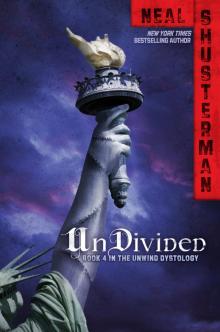 UnDivided
UnDivided UnBound
UnBound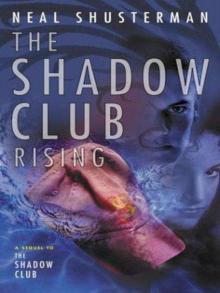 The Shadow Club Rising
The Shadow Club Rising Scorpion Shards
Scorpion Shards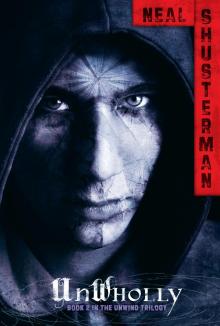 UnWholly
UnWholly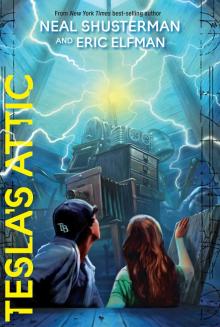 Tesla's Attic
Tesla's Attic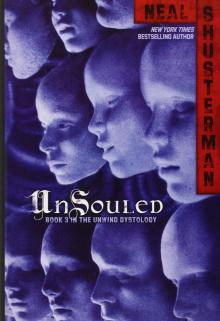 UnSouled
UnSouled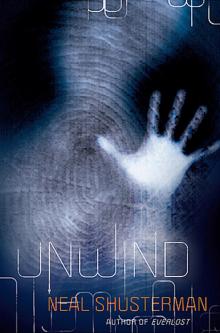 Unwind
Unwind Violent Ends
Violent Ends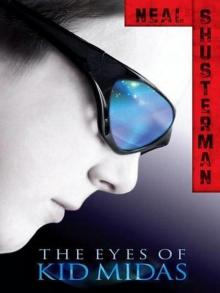 The Eyes of Kid Midas
The Eyes of Kid Midas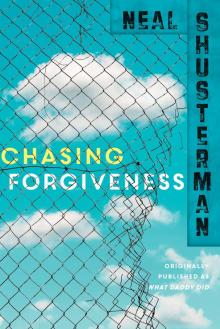 Chasing Forgiveness
Chasing Forgiveness Everfound
Everfound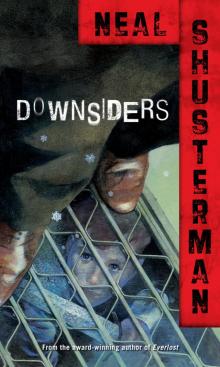 Downsiders
Downsiders The Schwa Was Here
The Schwa Was Here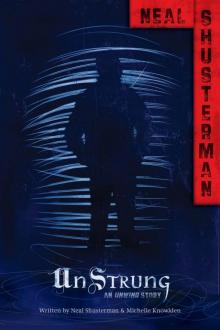 UnStrung
UnStrung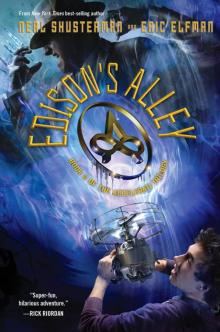 Edison's Alley
Edison's Alley Duckling Ugly
Duckling Ugly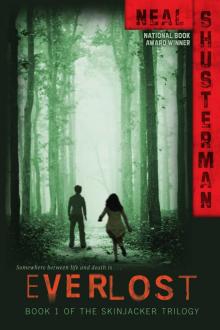 Everlost
Everlost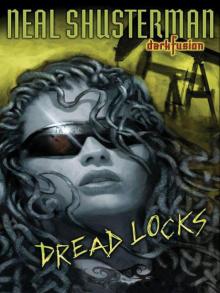 Dread Locks
Dread Locks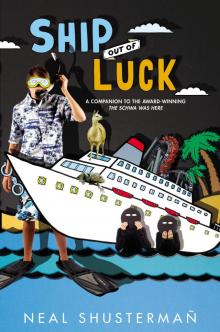 Antsy Floats
Antsy Floats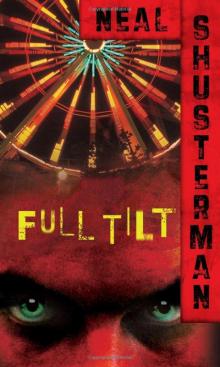 Full Tilt
Full Tilt Thunderhead
Thunderhead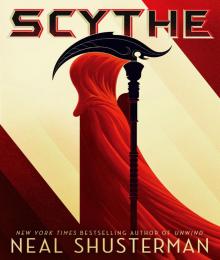 Scythe
Scythe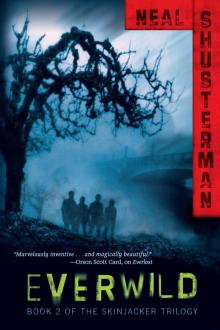 Everwild
Everwild Challenger Deep
Challenger Deep Shattered Sky
Shattered Sky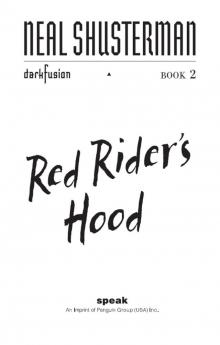 Red Rider's Hood
Red Rider's Hood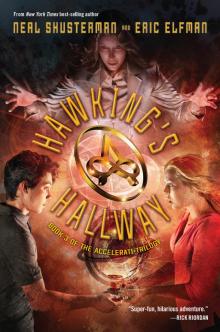 Hawking's Hallway
Hawking's Hallway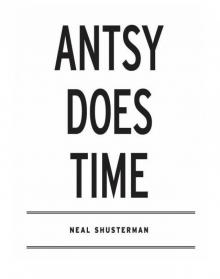 Antsy Does Time
Antsy Does Time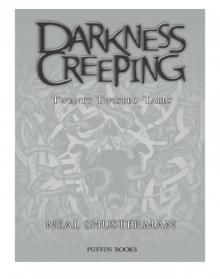 Darkness Creeping: Twenty Twisted Tales
Darkness Creeping: Twenty Twisted Tales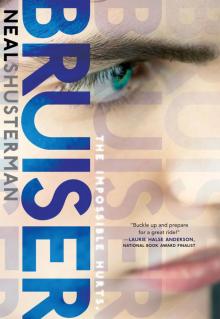 Bruiser
Bruiser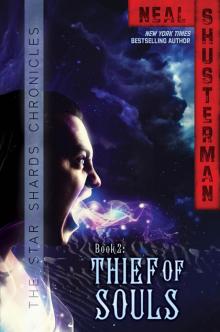 Thief of Souls
Thief of Souls The Toll
The Toll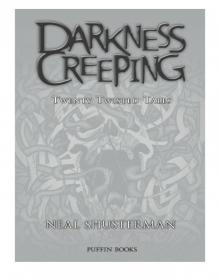 Darkness Creeping
Darkness Creeping Resurrection Bay
Resurrection Bay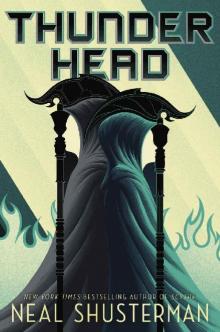 Thunderhead (Arc of a Scythe Book 2)
Thunderhead (Arc of a Scythe Book 2)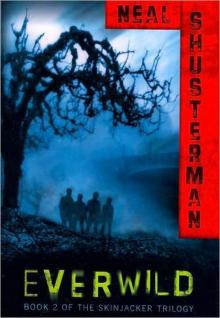 Everwild (The Skinjacker Trilogy)
Everwild (The Skinjacker Trilogy)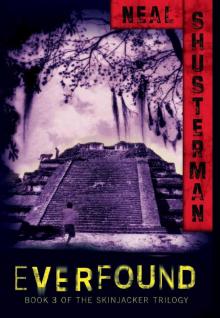 Everfound s-3
Everfound s-3 Edison’s Alley
Edison’s Alley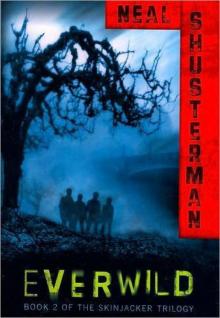 Everwild s-2
Everwild s-2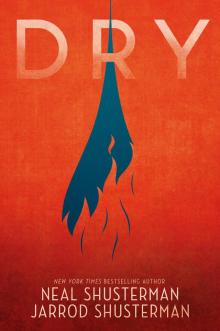 Dry
Dry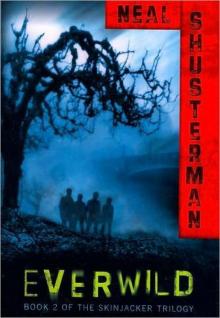 Skinjacker 02 Everwild
Skinjacker 02 Everwild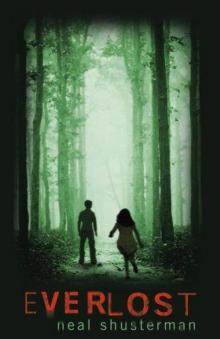 Everlost s-1
Everlost s-1